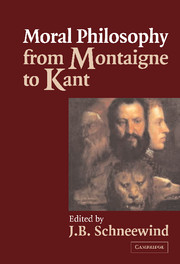Book contents
- Frontmatter
- Contents
- Preface
- Acknowledgments
- Foreword to the One-Volume Reprint
- Introduction
- PROLEGOMENA: SOME QUESTIONS RAISED
- PART I REWORKING NATURAL LAW
- Francisco Suarez
- Hugo Grotius
- Thomas Hobbes
- Richard Cumberland
- Samuel Pufendorf
- John Locke
- PART II INTELLECT AND MORALITY
- PART III EPICUREANS AND EGOISTS
- PART IV AUTONOMY AND RESPONSIBILITY
- Supplemental Bibliography
Francisco Suarez
Published online by Cambridge University Press: 05 June 2012
- Frontmatter
- Contents
- Preface
- Acknowledgments
- Foreword to the One-Volume Reprint
- Introduction
- PROLEGOMENA: SOME QUESTIONS RAISED
- PART I REWORKING NATURAL LAW
- Francisco Suarez
- Hugo Grotius
- Thomas Hobbes
- Richard Cumberland
- Samuel Pufendorf
- John Locke
- PART II INTELLECT AND MORALITY
- PART III EPICUREANS AND EGOISTS
- PART IV AUTONOMY AND RESPONSIBILITY
- Supplemental Bibliography
Summary
Introduction
Francisco Suarez (1548–1617) was one of a number of Spanish scholastic thinkers who transmitted and elaborated the views of Saint Thomas Aquinas (1224–74). Unpromising as a student, he was eventually accepted into the Jesuit order and became a priest. Suarez taught at a number of Spanish universities and in Rome, attaining great fame and wide influence. He was very prolific, writing on many metaphysical and theological topics and on the political problems of his time, such as the treatment of Catholics in England, as well as on natural law. His works tend to be lengthy. He generally gives careful consideration of the views of many others who have written on his subject, discussing their arguments and their biblical and other citations in detail, and only slowly coming to the presentation of his own final position. Drastic cutting was needed to obtain selections that might convey some of the main points of Suarez's theory within a reasonable number of pages. But even in abridged form there are a bewildering number of distinctions and claims to keep in mind if Suarez's theory is to be seen as a coherent whole.
Suarez accepted the general theses of classical natural law theory as it was developed by Saint Thomas Aquinas. Like Saint Thomas he presented a universe created and governed by God in ways designed to benefit each thing in it and to work for the common good of the whole creation.
- Type
- Chapter
- Information
- Moral Philosophy from Montaigne to Kant , pp. 67 - 87Publisher: Cambridge University PressPrint publication year: 2002

